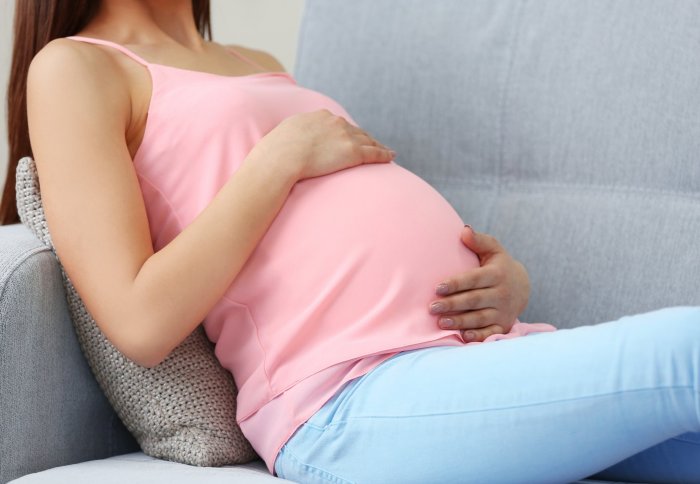Group B Strep infection may cause 150,000 stillbirths and infant deaths a year
by Ryan O'Hare

One in five pregnant women around the world are harbouring a potentially deadly bacterium that could kill their babies, according to new research.
Group B Streptococcus (GBS) disease is a preventable condition caused by bacteria that colonise the vagina and birth canal, and can be fatal to unborn babies and infants if not detected and treated.
While the bug can be detected through routine screening, many women may be unaware that they carry it until it affects the health of their child, particularly in developing regions with limited access to screening.
In a series of 11 papers, published today in the journal Clinical Infectious Diseases, researchers have for the first time reported the global scale of the problem.
Their findings reveal that an estimated 21.7 million pregnant women carry GBS and most are currently unidentified and untreated. Out of 410,000 GBS cases every year, there will be at least 147,000 stillbirths and infant deaths globally.
The research was led by the London School of Hygiene and Tropical Medicine, and involved more than 100 researchers at institutions around the world, including the Centre for International Child Health (CICH) at Imperial College London.
Funded by a grant from the Bill & Melinda Gates Foundation, this is the first comprehensive report of GBS globally, including data and estimates for the year 2015 from every country of the world, including outcomes for pregnant women, their babies and infants.
Global impact
GBS was found to be present among pregnant women in all regions of the world, with an average of 18% of pregnant women worldwide carrying the bacteria. Africa had the highest burden, with 54% of estimated cases and 65% of GBS-attributable stillbirths and infant deaths.
This series of papers shows the global burden of disease and the potential impact of a vaccine for pregnant women and newborn babies.
– Professor Beate Kampmann
Director of CICH
GBS can cause serious infections, such as meningitis and septicaemia, which may lead to stillbirths and newborn and infant deaths. If they survive, babies can develop permanent problems including hearing or vision loss, or permanent neurological damage. However, despite a number of vaccines to prevent GBS in development, none are yet available.
Beate Kampmann, Professor of Paediatric Infection & Immunity and Director of the CICH at Imperial, said: “The core of our research is focused on advancing the vaccine development for GBS. If we want to drive down the number of deaths caused by this disease, having an effective vaccine is critical.
“This series of papers shows the global burden of disease and the potential impact of a vaccine for pregnant women and newborn babies. Delivering such a vaccine could save thousands of lives each year.”
The group’s analysis found that if a maternal GBS vaccine was to be developed that was 80% effective and reached 90% of women, based on the global estimates, vaccination could potentially prevent 231,000 infant and maternal GBS cases per year.
Current prevention strategies
Another key aspect is screening, which can help to catch the bacteria before damage is done. GBS is carried by up to a third of adults, usually with no symptoms. In women, GBS can live harmlessly in the digestive system or lower vaginal tract, from where it can be passed to the unborn baby through the amniotic fluid or to newborns during labour.
Current GBS prevention focuses on giving antibiotics to women in labour, aiming to reduce disease in infants at delivery. At least 60 countries have a policy for antibiotic use in pregnancy to prevent newborn GBS disease. Of those, 35 have a policy to test all pregnant women to see if they carry GBS, and the remaining 25 countries identify women with clinical risk factors. However, implementation of these policies varies around the world.
Kirsty Le Doare, Clinical Senior Lecturer in Paediatric Infectious Diseases at the Imperial CICH, and co-author of the new research papers, said: “Through effective screening we can dramatically reduce the mortality rate, just through detecting which mothers are colonised. We have shown that screening programmes for GBS can help to identify those babies who may be most at risk, providing us with a vital window to intervene.”
Professor Joy Lawn from LSHTM, who co-led the series of papers, said: “Too many parents around the world face the death of a baby or a young child – avoidable GBS deaths are happening in every country.
“Antibiotics currently prevent an estimated 29,000 cases of early-onset GBS disease per year, almost all in high-income settings. However, this approach may be difficult to implement in low-income settings where many births take place at home, and laboratory capacity for screening for GBS is limited. In addition, giving antibiotics to 21.7 million women may contribute to antimicrobial resistance – a major global health crisis.”
-
The series of 11 papers is published in the journal Clinical Infectious Diseases.
This article is based on materials provided by the LSHTM
Article text (excluding photos or graphics) © Imperial College London.
Photos and graphics subject to third party copyright used with permission or © Imperial College London.
Reporter
Ryan O'Hare
Communications Division
